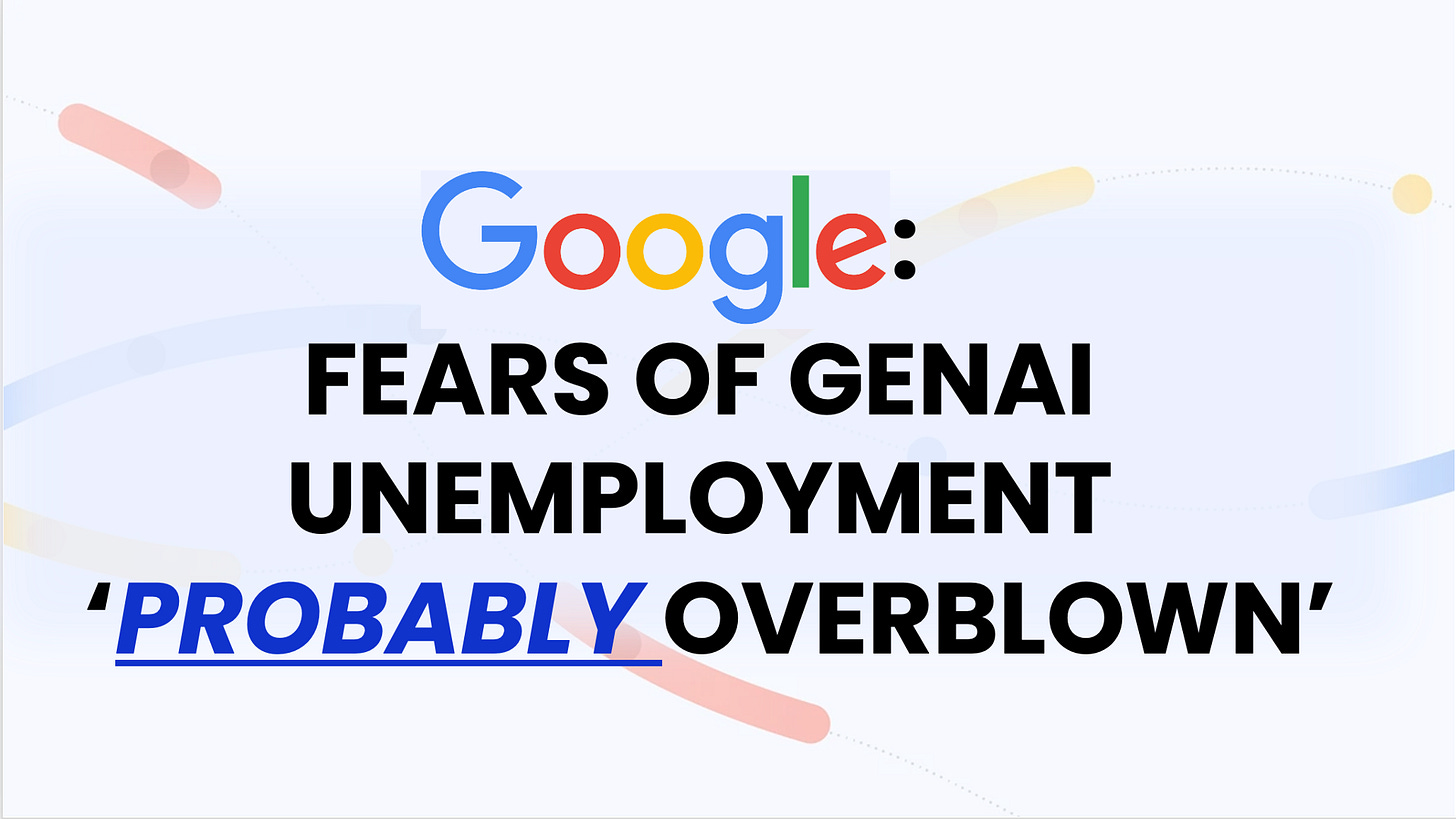Google: no ‘straight line’ between generative AI and unemployment
Do you believe them?
Google wants us to believe that GenAI isn’t coming for your job.
This may seem self-serving, and if it strikes you as odd after reading countless reports by management consultants gleefully selling GenAI cost savings, you’re not alone.
Still, this is a great read and gives us many insights into our shared AI future, which I do believe will be a bright one for some.
While GenAI is touted as a “General-Purpose Technology” along with historical precedents like steam and electric power I think Google is missing something.
Steam and Electric were both technologies that aimed at physical labor, Gen AI is the first to target intellectual labor.
GenAI isn’t coming for factory floor jobs but for doctors, lawyers, and, cross our fingers, management consultants.
If you’re a knowledge worker, as most of my readers are, you should be concerned.
👉TAKEAWAYS
Generative AI is one of the rare technologies powerful enough to accelerate overall economic growth---what economists call a “general-purpose technology.” These innovations have the potential to positively transform economies and societies.
By one estimate, close to 80% of the jobs in the U.S. economy could see at least 10% of their tasks done twice as quickly (with no loss in quality) via the use of generative AI.
Previous general-purpose technologies like the steam engine and electrication have brought their changes over decades. We anticipate that generative AI’s effects will be felt more quickly due to its ease of diffusion.
This technology is already delivering large productivity gains, which will increase and spread. As a result, economic growth will speed up.
In addition to faster growth, generative AI will reduce demand for some skills, increase demand for others, and create demand for entirely new ones.
Fears of large-scale technological unemployment are probably overblown. The history of general-purpose technologies shows that the growth they bring is accompanied by strong demand for labor.
However, this increased demand is often in new occupations. More than 85% of total U.S. employment growth since 1940 has come in entirely new occupations
The rapid changes brought by the spread of generative AI will require prompt and effective reskilling efforts.
Generative AI is particularly effective at improving the performance of entry-level employees, helping with wage inequality.
Previous general-purpose technologies have resulted in changes to the companies and countries leading the way in different industries. We believe that generative AI will be similarly powerful.
👊STRAIGHT TALK👊
So is GenAI coming for your job? If you are a knowledge worker, the answer is yes.
Google suggests that our fears of unemployment are ‘probably’ overblown and they are most likely correct in that I wouldn’t lose sleep just yet.
Given GenAI’s obvious issues with bias, lack of explainability and hallucinations, I think that most of our jobs are safe for the next few years.
Beyond 5 years out, however, most of us should be taking courses in plumbing or electricity rather than big data analysis.
WARNING: Google is not painting a rosy picture for the existing labor pool.
The most ominous prediction is that a large portion of any new jobs GenAI creates will be in new occupations.
This means that customer services personnel will not be retrained to become prompt engineers, and the number of new GenAI hires will not exceed the number of those let go.
In order to get corporates to buy into GenAI, big tech needs to sell the savings, which in GenAI’s case means jobs.
I don’t believe Google is being fully candid that an entire generation will likely have their labor disrupted.
Thoughts?







Good read. Thank you for sharing.
Increasing productivity does require technology adoption by the people: this is hard to speed up as it depends on the societies' ability to embrace innovation. In recent years, we have seen more innovation across Asia than in the western world as young generation did jump into the mobile and digital world faster than anywhere else.
As a result, we have super apps to perform any task, pay by QR codes across countries, get access to integrated government services where paper is no longer required etc...
While I believe the workers who are augmented with AI / GenAI tool will take the jobs from the ones who don't use these tools, we will have to wait for a few years before feeling the real effect of this technology revolution. Interestingly, we (tech workers) are the first to feel it as we are using these tools to code, serve customers, run our own businesses.